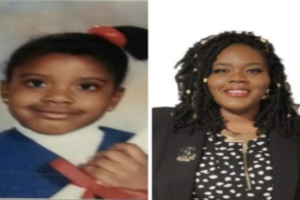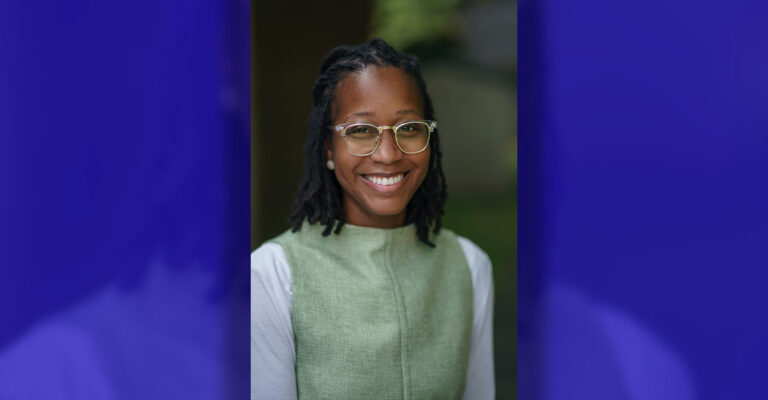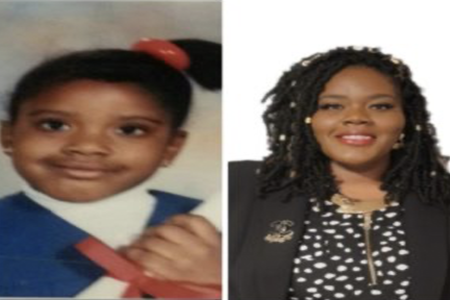By Aundrea Tabbs-Smith, Emotional Well-being Literacy and Curriculum Coordinator, Friends Center for Children
I spent my earliest years as an educator searching for books that reflected my students’ experiences; I wanted to introduce them to books that reflected not just the colors of their skin, but also the textures of their lives. I wanted them to see themselves as I saw them: loved, powerful, and full of potential. Too often, those stories were missing from the shelves.
As the Emotional Well-being Literacy and Curriculum Coordinator at Friends Center for Children in New Haven, Conn., I lead programming for the organization’s new Books with Friends Trolley – a mobile library that provides professional development and age- and culturally-appropriate books to family- and center-based childcare providers across New Haven. I spend my days working with young children, teaching them to name their feelings, build confidence, and understand that every part of who they are deserves to be celebrated. Books are one of our best tools to do that work. When a child hears a story that reflects their truth, something shifts fundamentally. They feel seen. Their eyes light up, their shoulders relax, and their minds open to the possibilities that await them. Below are just a few of my favorite affirming books for Black children, which will help them build that sense of belonging and possibility from their earliest moments.
Homemade Love by bell hooks
Appropriate for ages birth through 3-years-old
The celebrated poet and feminist thinker bell hooks teamed up with illustrator Shane W. Evans to create a lyrical, love-soaked board book that reminds children that they are loved, cherished and supported, even when they make mistakes or feel afraid.
I love this book because it’s a gentle affirmation of unconditional love, perfect for bedtime or any moment a child needs reassurance. The text is simple yet lyrical, filled with affectionate nicknames and rhythmic phrasing that makes it perfect for reading aloud. This book is a tender anthem for secure attachment, which is something every young child needs to thrive.
Bedtime Bonnet by Nancy Redd
Appropriate for 2- through 6-years-old
This joyful tribute to family is the first picture book to shine a light on nighttime hair rituals for Black people, an experience familiar to many young girls who’ve misplaced their bonnet before bed. Bedtime Bonnet offers a tender glimpse into cherished hair care traditions and honors the deep bonds shared across generations in a loving, close-knit Black family.
This book showcases the importance of hair care in Black culture, making it both relatable and educational. It also reinforces the idea that these small acts are part of a shared experience. For any child with a nighttime hair routine, it’s a validating and joyful reflection of their lives.
I Am Every Good Thing by Derrick Barnes
Appropriate for 3- through 8-years-old
The bold and self-assured narrator in this story dreams big and embraces every part of who he is. He is imaginative, daring, intelligent, humorous, and loyal. He stumbles at times, but when the fear creeps in, he never stops showing the world his true self. This book is powerful because it centers a confident young Black boy who celebrates his identity, dreams, and resilience. It offers a counter-narrative to stereotypes, showing Black children as joyful, brilliant, and full of promise. And the prose is beautiful, rhythmic and bold; this reads like a spoken word poem.
Jayden’s Impossible Garden by Mélina Mangal
Appropriate for 4- through 9-years-old
Jayden finds beauty and life all around him in the city, from squirrels foraging to cardinals singing and dandelions blooming. But when his mom isn’t convinced that nature exists in such a busy place, Jayden is determined to change her mind. Jayden teams up with his friend Mr. Curtis to start a community garden. As the garden grows, so does a sense of connection among neighbors, and soon his mom begins to see the wonder of nature through Jayden’s eyes. This book gently challenges the idea that nature only exists in rural spaces. It shows how even in a bustling city, life flourishes. It inspires young readers to notice and care for the natural world around them, wherever they live.
Emotional well-being starts early and is built on the foundations of connection, reflection and love. When we read stories that affirm who children are, we teach them pride, compassion and belonging. These books aren’t just stories; they’re tools for building identity and healing. Some of my most powerful experiences working with young children have been reading to children who see themselves in a book for the first time, smiling as someone whispers, “That looks like me.”
Aundrea Tabbs-Smith is the emotional well-being literacy and curriculum coordinator at Friends Center for Children in New Haven. She’s also the author of Never Too Much and For the Quiet Black Girl: Trying to Find Her Voice in a Predominately White Space.







